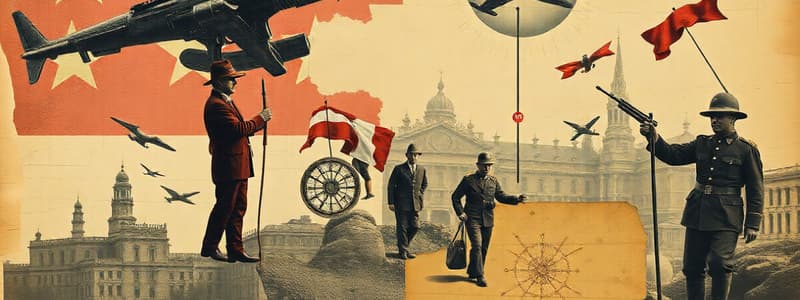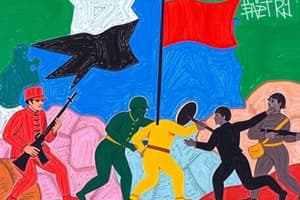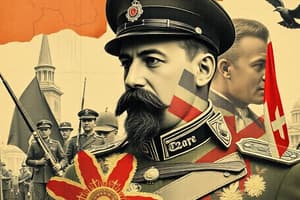Podcast
Questions and Answers
Militarism refers to a country's desire to have the largest military and the deadliest weapons.
Militarism refers to a country's desire to have the largest military and the deadliest weapons.
True (A)
Nationalism is characterized by people wanting to be ruled by another government.
Nationalism is characterized by people wanting to be ruled by another government.
False (B)
The main reasons for imperialism include gaining resources and increasing power.
The main reasons for imperialism include gaining resources and increasing power.
True (A)
Alliances during WWI included countries that were unwilling to help each other in conflicts.
Alliances during WWI included countries that were unwilling to help each other in conflicts.
The Triple Entente consisted of Britain, France, and Russia.
The Triple Entente consisted of Britain, France, and Russia.
Flashcards
Militarism
Militarism
A nation's desire to have the strongest military with the most advanced weapons, often driven by a belief of superiority over other nations.
Nationalism
Nationalism
Extreme pride and loyalty to one's own nation, often involving a belief in its superiority and willingness to fight for its interests.
Imperialism
Imperialism
The practice of powerful nations taking over other territories by force, usually to gain resources or expand their power.
Alliances
Alliances
Signup and view all the flashcards
How did Nationalism and Militarism contribute to WWI?
How did Nationalism and Militarism contribute to WWI?
Signup and view all the flashcards
Study Notes
Four Causes of WWI
-
Militarism
- Militarism is the belief that a nation should maintain a strong military and be prepared to use it aggressively to defend or promote national interests.
- Countries competed to have the largest, most powerful military forces, including the newest and deadliest weapons.
- The Industrial Revolution led to the creation of new technologies like tanks, hand grenades, machine guns, airplanes, poisonous gas, and flamethrowers.
- These advancements fueled the desire for stronger militaries and a willingness to use these new weapons.
-
Nationalism
- Nationalism is intense pride and loyalty to one's nation or ethnic group.
- Nations often sought to prove their superiority over others.
- Nationalism can lead to a desire for independence from foreign rule or the desire to expand a nation's territory.
- Nationalist fervor was a major motivator for conflict, encouraging nations to fight for their perceived rights.
-
Imperialism
- Imperialism is the policy of extending a country's power and influence through diplomacy or military force.
- Nations competed for colonies and resources.
- A primary motive was the acquisition of resources and expansion of power.
- European powers, in particular, divided Africa and Southeast Asia amongst themselves.
- This competition for resources and power often led to conflict and tension, a major contributor to World War I.
-
Alliances
- Alliances are agreements between countries to support each other.
- European nations formed alliances to protect each other in case of attack.
- The system of alliances created a domino effect.
- If one country was attacked, its allies were obligated to defend it.
- This complex web of alliances meant that a localized conflict could quickly escalate into a wider war.
- Germany, Austria-Hungary, and Italy formed the Triple Alliance.
- Britain, France, and Russia formed the Triple Entente.
Studying That Suits You
Use AI to generate personalized quizzes and flashcards to suit your learning preferences.




